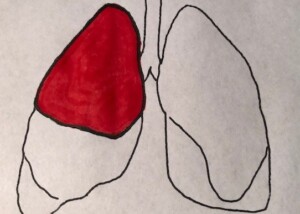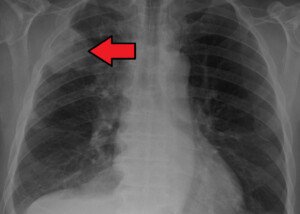How long can a cancer be growing inside your lung before it starts causing the first symptom?
Symptoms of lung cancer include persistent cough, coughing up blood or phlegm, unexplained fatigue, unexplained weight loss, appetite suppression and shortness of breath, among others.
“No one really knows, as you can’t be sure when the cancer first showed up,” says Alex Little, MD, a thoracic surgeon with a special interest in esophageal and lung cancer.
“The location of the tumor would affect how quickly it could cause symptoms,” continues Dr. Little.
“If it’s centrally located and can quickly irritate or obstruct a large airway, it will soon cause a cough or pneumonia.
“If near the periphery of the lung, it can invade into the chest wall and cause pain.”
That pain would manifest as in the back and/or shoulder.
In cases with back or shoulder pain, the diagnosis of lung cancer is sometimes significantly delayed from the first time that the patient begins feeling the back or shoulder pain – and then finally decides to see a doctor about it.
This is because back and shoulder pain is extremely common, with the No. 1 cause – by far – being musculoskeletal in origin.
This means improper biomechanics when lifting things on the job or around the house, poor form when weightlifting at the gym, and sports in which throwing or swinging are involved.
By the time lung cancer is diagnosed as the cause of back or shoulder pain, it’s anyone’s guess how long the cancer had been there before the patient first began realizing there was a problem with their back or shoulder.
Chest pain is another potential symptom.
People are more apt to promptly seek an evaluation for chest pain rather than for back or shoulder pain.
This will mean a much faster diagnosis if the cause is lung cancer.
But again, how long the cancer might’ve been growing in the lung, prior to the first episode of chest pain symptoms, simply is not known.
“Tumors in the lung that don’t fit either category — very central or very peripheral — can presumably spend time growing before they cause symptoms,” says Dr. Little.
“The fact that most cancers are asymptomatic emphasizes the value of screening at-risk populations.”
 Alex Little, MD, trained in general and thoracic surgery at the Johns Hopkins University School of Medicine; has been active in national thoracic surgical societies as a speaker and participant, and served as president of the American College of Chest Physicians. He’s the author of “Cracking Chests: How Thoracic Surgery Got from Rocks to Sticks,” available on Amazon.
Alex Little, MD, trained in general and thoracic surgery at the Johns Hopkins University School of Medicine; has been active in national thoracic surgical societies as a speaker and participant, and served as president of the American College of Chest Physicians. He’s the author of “Cracking Chests: How Thoracic Surgery Got from Rocks to Sticks,” available on Amazon.
 Lorra Garrick has been covering medical, fitness and cybersecurity topics for many years, having written thousands of articles for print magazines and websites, including as a ghostwriter. She’s also a former ACE-certified personal trainer.
Lorra Garrick has been covering medical, fitness and cybersecurity topics for many years, having written thousands of articles for print magazines and websites, including as a ghostwriter. She’s also a former ACE-certified personal trainer.
.










































